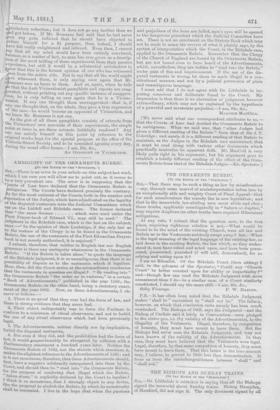AMBIGUITY OF THE ORNAMENTS RUBRIC.
[TO TES EDITOR OF TER " SPEOTAT011.")
S111,—There is an error in your article on this subject last week, which I am sure you will allow me to point out as it seems to be a very prevalent one. The error is in supposing that the courts of Law have declared that the Ornaments Rubric is .tnbiguous. The Courts have declared precisely the contrary. By far the most eminent of the Courts, both in the number and reputation of the Judges, which have adjudicated on the legality of the disputed vestments were the Judicial Committees which eat on the Liddell and Ridsdale cases. The former declared that " the same dresses which were used under the First Prayer-book of Edward VI., may still be used." The Judgment in the Ridsdale case, which is the last on the subject, Says :—" In the opinion of their Lordships, if the only law as to the vesture of the Clergy is to be found in the Ornaments Rubric, the use of the vestments of the First Edwardian Prayer- book is not merely authorised, it is enjoined." I submit, therefore, that neither in English law nor English .grammar is there any ambiguity whatsoever in the Ornaments Rubric. " If the Rubric is taken alone," to quote the language of the Ridsdale judgment, it is so unambiguous, that there is no possibility of dispute as to the vestments which it legalises. How, then, did the Court arrive at the extraordinary conclusion that the vestments in question aro illegal P " By reading into" the Ornaments Rubric "the order as to vestures," in a certain 4` Book of Advertisements," published in the year 1566; the Ornaments Rubric, on the other hand, being a statutory enact- ment of the year 1662. Now, on these Advertisements, I ob- serve as follows :-
1. There is no proof that they ever had the force of law, and there is strong evidence that they never had.
2. Their object indisputably was to force the Puritans to ()dorm to a minimum of ritual observance, and not to forbid the use of any ritual observance which had been previously legal.
3. The Advertisements, neither directly nor by implication, forbid the disputed vestments.
4. But even if they did, and the prohibition had the force of law, it would nnquestionably be abrogated. by collision with a Parliamentary enactment a hundred years later. Neither the Ornaments Rubric of 1662, nor the statute which sanctions it, makes the slightest reference to the Advertisements of 1566 ; and is it not monstrous, therefore, that those Advertisements should, first, have a negative arbitrarily interpolated into them by the Court, and should then be " read into " the Ornaments Rubric, for the purpose of rendering that illegal which the Rubric, "taken alone," is explicitly declared by the Court to legalise P I think it so monstrous, that I strongly object to any device, like the proposal to abolish the Rubric, by which its monstrosity shall be concealed. I live in the hope that when the passions
and prejudices of the hour are lulled, inen's eyes will be opened to the dangerous precedent which the Judicial Committee have set. There is not an enactment on the Statute l3ook which may not be made to mean the reverse of what it plainly says, by the system of interpretation which the Court, in the Ridsdale case, applied to the Ornaments Rubric. Remember that the Clergy of the Church of England are bound by the Ornaments Rubric, but are not bound even to have heard of the Advertisements, which, nevertheless, they are bidden to " road into the Rubric," under pain of flue and imprisonment. If the use of the dis- puted vestments is wrong, let them be made illegal in a con- stitutional manner, and not by a judicial perversion of plain and unambiguous language.
I must add that I do not agree with Dr. Littledale in im- puting conscious and deliberate fraud to the Court. My impression is that there is no aberration of judgment, however extraordinary, which may not be explained by the hypothesis of a powerful and inveterate prejudice.—I am, Sir, &c., MALCOLM MAOCOLL.
[We never said what our correspondent attributes to us,— that the Courts. of Law had decided the Ornaments Rubric to be ambiguous. What we said was, that "other Judges had given a different reading of the Rubric" from that of Sir J. T. Coleridge; and surely it is a different reading of that Rubric to maintain, as the Judges in the Ridsdale case maintained, that it must be read along with various other documents which practically neutralise its apparent drift. Mr. MacColl is very likely quite right in his argument ; but his argument goes to establish a totally different reading of tho effect of the Orna- ments Rubric from that of the Ridsdale Judges.—En. Spectator.]


































 Previous page
Previous page